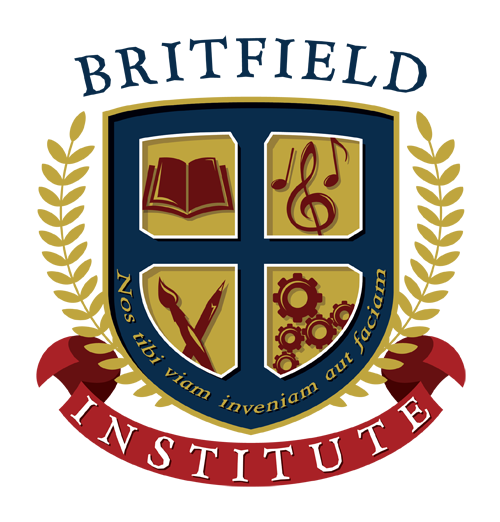About Us
The Britfield Institute is dedicated to encouraging young people to value knowledge. Creativity, literacy and leadership are at the core of our programs and workshops. Partnering with schools and organizations throughout the nation, Britfield wants to put creativity back into the classroom. Most children are highly gifted if they are given the proper opportunities and support. From their imaginations come a wealth of original ideas and pioneering innovations. Yet most of our educational organizations are designed to discourage creative thinking and undermine the very attributes that foster individualism and original thought. Based on our research, we have found that most children flourish when given the chance to write, invent, paint, build, dance, or learn music. These talents open worlds of creativity that foster ingenuity and visionary leadership.
Britfield wants to bring the valuable skills of creativity, literacy, entrepreneurship and business proficiency back into schools and classrooms. We have established engaging, interactive programs that help inspire, foster, and encourage students to transform their ideas into real innovations and products: a book, an invention, a website, a service, or a business.
Our programs consist of three phases. Phase one introduces exciting, interactive presentations to foster children’s curiosity and creativity. The second phase helps students cultivate their ideas through classes and workshops supervised by experts who facilitate the creative process. In the third phase, we choose unique and innovative ideas from select students who exhibit ambition, talent, and gumption. We then mentor these students, providing further assistance and financial support to bring their ideas to market. Whether it is a book, game, app, commercial, website, film short, product, or service, we will help turn these ideas into realities.
Creativity • Literacy • Leadership • Innovation • Entrepreneurship
The problem lies within our educational system, which has destroyed the passion for learning. Some parents are disheartened by the inadequate curricula. Others are concerned about what they see as a concerted effort to discourage creativity and criticize independent thinking. Instead of nurturing future leaders, our educational system is fostering mindless complacency. This mindset funnels students into vocations and corporate protocols that end in careers lacking in creativity and true passion. Not only are children being misdirected, they are being forced to ignore their true gifts and passion for life.
One example is the cognitive importance of learning music and mastering a musical instrument at an early age. This subject offers children a wonderful opportunity to learn, explore, and create. Research has found that people with a musical background tend to make exceptional organizational leaders: their creativity, agility, brain development, cognitive reasoning, and capacity to overcome problems are often superior to those without any musical training. Music gives employees an edge in the corporate arena. Even Apple and Google have implemented workshops in music, painting, and drawing to improve their employees’ creative abilities. So why are music and the arts the first subjects marginalized or discontinued at schools when science has shown us just how important they are?
Prior to the 19th century, there was little compulsory education for children. Public education evolved to meet the needs of industrialism. Consequently, most schools worldwide have the same hierarchy of subjects founded on two principles. First, the useful subjects for work are at the top, which is why most children are steered away from subjects they most enjoy, because those subjects are not associated with the skills traditional jobs require. “Don’t do music, you’re not going to be a musician; don’t do art, you won’t be an artist. Misguided advice—now profoundly mistaken. And the second is academic ability, which has come to dominate our view of intelligence, because the universities designed the system in their image,” says Sir Ken Robinson, Do Schools Kill Creativity? Our educational system places conformity above creativity, and the consequences are that many talented and imaginative children never discover their creative abilities or their true potential.
People’s careers usually start with the quality and impact of their education. However, our entire educational system is predicated on a well-established hierarchy of academic ability, with mathematics and languages at the top, followed by humanities, and at the bottom, the arts. Why? Research proves that creativity and the arts are essential to cognitive development and intelligence. Why not offer a more balanced curriculum? Anyone can pursue a creative career if given the opportunity.
Few students stumble into a career in music, film, or art, but when their creativity is nurtured, they pursue these vocations with passion. Truthfully, there are few engineers or lawyers who love their jobs; few accountants or financial advisers believe they have found their calling. While these careers are necessary, many have been replaced by computers or outsourced to other countries. By the year 2025, 90% of all accounting jobs and 39% of all legal jobs will be accomplished through artificial intelligence. However, AI cannot replace the essential skill of the future, creativity. A recent IBM poll of 1,500 CEOs identified creativity as the number one leadership competency of the future.
Everyone thinks and learns differently. “We know three things about intelligence. First, it’s diverse. We think about the world in all the ways that we experience it. We think visually, we think in sound, and we think kinesthetically. We think in abstract terms; we think in movement. Secondly, intelligence is dynamic. If you look at the interactions of a human brain, intelligence is wonderfully interactive. The brain isn’t divided into compartments. In fact, creativity often comes about through the interaction of different disciplinary ways of seeing things. And the third thing about intelligence is that it’s distinct.” Sir Ken Robinson, Do Schools Kill Creativity?
